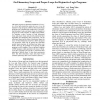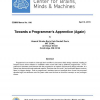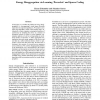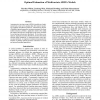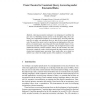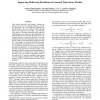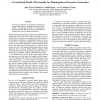AAAI
2015
9 years 9 months ago
2015
This paper proposes an alternative definition of elementary loops and extends the notion of proper loops for disjunctive logic programs. Different from normal logic programs, the...
AAAI
2015
9 years 9 months ago
2015
One key challenge in statistical relational learning (SRL) is scalable inference. Unfortunately, most realworld problems in SRL have expressive models that translate into large gr...
AAAI
2015
9 years 9 months ago
2015
Programmers are loathe to interrupt their workflow to document their design rationale, leading to frequent errors when software is modified—often much later and by different p...
AAAI
2015
9 years 9 months ago
2015
The Web contains a large amount of information in the form of videos that remains inaccessible to the visually impaired people. We identify a class of videos whose information con...
AAAI
2015
9 years 9 months ago
2015
The paper presents an approach for optimizing the evaluation of SPARQL queries over OWL ontologies using SPARQL’s OWL Direct Semantics entailment regime. The approach is based o...
AAAI
2015
9 years 9 months ago
2015
In this paper, we consider the problem of energy disaggregation, i.e., decomposing a whole home electricity signal into its component appliances. We propose a new supervised algor...
AAAI
2015
9 years 9 months ago
2015
Autoregressive moving average (ARMA) models are a fundamental tool in time series analysis that offer intuitive modeling capability and efficient predictors. Unfortunately, the l...
AAAI
2015
9 years 9 months ago
2015
Querying inconsistent ontologies is an intriguing new problem that gave rise to a flourishing research activity in the description logic (DL) community. The computational complexi...
AAAI
2015
9 years 9 months ago
2015
Most typical statistical and machine learning approaches to time series modeling optimize a singlestep prediction error. In multiple-step simulation, the learned model is iterativ...
AAAI
2015
9 years 9 months ago
2015
We present an approach to incorporate interesting and compelling characters in planning-based narrative generation. The approach is based on a computational model that utilizes ch...
